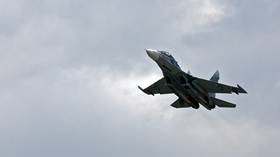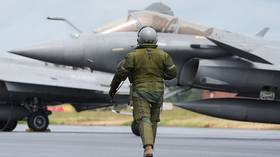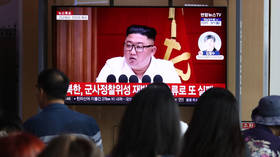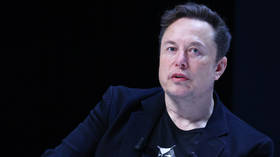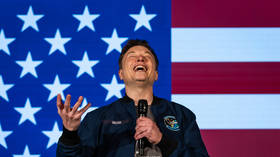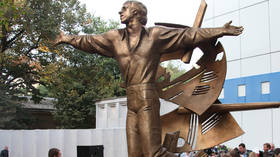L'enfant terrible? Macron taunts Trump on Armistice Day amid talk of empire and EU army
French President Macron rebuked the concept of 'nationalism' during Armistice Day celebrations marking the end of WWI. At the same time, his government was pondering the merits of empire and building an all-European army.
Donald Trump's trip to France got off to a bumpy start, and the world is still experiencing the turbulence today. Ahead of Trump's arrival in Paris for the celebrations, Macron dropped a bombshell, speaking out on behalf of an all-European military force, which would be totally free of US patronage.
"We have to protect ourselves with respect to China, Russia and even the United States of America," he told French radio.
Although Trump and Macron made nice for the cameras in Paris, the US leader referred to Macron's remarks as "very insulting."
President Macron of France has just suggested that Europe build its own military in order to protect itself from the U.S., China and Russia. Very insulting, but perhaps Europe should first pay its fair share of NATO, which the U.S. subsidizes greatly!
— Donald J. Trump (@realDonaldTrump) November 9, 2018
But the entertainment did not end there.
Macron, the former Rothschild banker who rose from relative obscurity to defeat Marine Le Pen in the 2017 French elections, paid homage to the centennial event with a speech that seemed to fall short of honoring the roughly 10 million soldiers who perished in that bloody global conflagration.
In the shadow of the Arc de Triomphe, Macron used the solemn occasion to indulge his audience, which included nearly 70 world leaders, with his personal views on nationalism, which he defined as "a betrayal of patriotism."
Trump reaction as Macron calls nationalism “a betrayal of patriotism.” pic.twitter.com/1nuw6axme4
— ian bremmer (@ianbremmer) November 11, 2018
"The old demons are rising again, ready to complete their task of chaos and of death," the French leader said, in a thinly veiled swipe at Trump and his 'America first' program of national revival.
French President Macron jumps on a table to cheer France on to its 4-2 victory in #WorldCupFinal2018. https://t.co/1sLakDI9WJpic.twitter.com/5YrkPECbvB
— Jim Roberts (@nycjim) July 15, 2018
It seemed rather ironic, however, that the French leader would choose that particular moment to pontificate on the pitfalls of nationalism, and not just because it was a multinational effort that brought WWI to a close. After all, it was Macron who, during the 2018 World Cup championship in Moscow, jumped on a table in front of Vladimir Putin and fist-pumped the sky as the French national team emerged victorious against Croatia.
Was the French l'enfant terrible simply expressing youthful enthusiasm and harmless patriotism, or was it an egregious display of pent-up nationalism? Hard to say. But if it was the latter, can we blame any person – even Macron – for exhibiting some nationalistic fervor?
It goes without saying that nationalism is an unpredictable animal. On the one hand, it seems to be a necessary requirement for any country to remain viable and cohesive. On the other, there remains the perennial risk that nationalism, if left to its own devices, will go off the rails and mutate into something altogether sinister, like its diabolical alter-ego, fascism, which is a bit like nationalism on steroids. However, so long as it doesn't go to extremes, nationalism, as even Wikipedia politely sugarcoats it, "seeks to build a national cultural identity, by way of pride in national achievements, and is closely linked to patriotism…"
But now the globalist Macron wants to completely do away with nationalism and this deserves some comment. The question is whether the antidote to the scourge of nationalism that Macron vigorously advocates - that is, full-blown corporate globalism - is any less toxic as a political construct. I would have to say no, it is not. And, as Trump hammered home in yet another tweet, it would seem that the French people also support healthy nationalism.
The problem is that Emmanuel suffers from a very low Approval Rating in France, 26%, and an unemployment rate of almost 10%. He was just trying to get onto another subject. By the way, there is no country more Nationalist than France, very proud people-and rightfully so!........
— Donald J. Trump (@realDonaldTrump) November 13, 2018
Globalists like Macron continue to believe – without any empirical evidence to support their position – that bringing together myriad people under a single roof will solve all of humanity's most urgent issues. The threat of war, for example, will simply disappear because there will be no more nations to become radicalized by the seductive allure of nationalism. If only things were so simple.
In 2015, the year when Germany first opened its doors to a flood of undocumented migrants, Chancellor Angela Merkel stunned the world when she admitted"multiculturalism leads to parallel societies and therefore remains a sham." Globalism simply could not work without multiculturalism. Today, Merkel is a spent political force in Germany, where the political pendulum has swung to the right and anti-immigration parties like the AfD are a force to be reckoned with.
Macron must certainly be aware that the ambitious project known as globalization has been put on hold, possibly indefinitely, as a populist wave crashes down on the global status quo from Brazil to Italy. Or maybe he knows the situation but insists on plodding ahead anyways in the hopes of achieving the elusive New World Order that globalists salivate over.
Whatever the case may be, one particularly striking comment by a French cabinet member reinforced the idea that Macron was determined to rattle his American guest during the celebrations.
In an interview with the Handelsblatt newspaper, French Finance Minister Bruno Le Maire floated the idea of "Europe having to become a kind of Empire, as China is. And how the US is." And just in case anybody got the wrong impression about these nascent imperial plans, Le Maire said this empire would be a kind and friendly franchise: "I'm talking about a peaceful empire which is a constitutional state."
Such assurances did not prevent one British tabloid from screaming in a headline: "Napoleon dictatorship RETURNS"
So, is French President Macron sending a message to the global elite that he is up to the task of ushering in the next stage of globalism with calls for an empire and an army, or is he reverting back to the base instincts of raw nationalism, delivering a bold if improbable challenge to the American superpower?
Perhaps the best answer is 'both.' Thanks to the animosity Trump has attracted in the Western European capitals, Macron has thrown down the gauntlet, as it were, letting Washington know that it will not be pushed around any longer.
To ram home the point, Macron took advantage of a major global event to trash nationalism, Trump's pet domestic project, call for a European army to protect the continent from "China, Russia and the United States," while letting his finance minister hint at the prospect of creating a European empire to challenge the American goliath. As they would say in a Westerner, 'those are fighting words.' Whether France and the European Union can actually come through on its threats is an altogether different matter.
Emmanuel Macron suggests building its own army to protect Europe against the U.S., China and Russia. But it was Germany in World Wars One & Two - How did that work out for France? They were starting to learn German in Paris before the U.S. came along. Pay for NATO or not!
— Donald J. Trump (@realDonaldTrump) November 13, 2018
All things considered, the Macron-Trump epic showdown made for a colorful fireworks display in the French capital, which continues to light up the sky as far away as Washington. Trump fired up Twitter once back home, taking Macron and France to task for everything from French wine to paying up dues owed to NATO. It would all be very comical if so much were not riding on the line.
Looking at the severely strained transatlantic relationship today, it seems nothing short of a miracle that Europe and the United States were able, as powerful allies, to emerge victorious in WWI and WWII. In fact, many wonder today if such a feat would be possible for a third time, while praying we never need to find out.
Think your friends would be interested? Share this story!
The statements, views and opinions expressed in this column are solely those of the author and do not necessarily represent those of RT.



